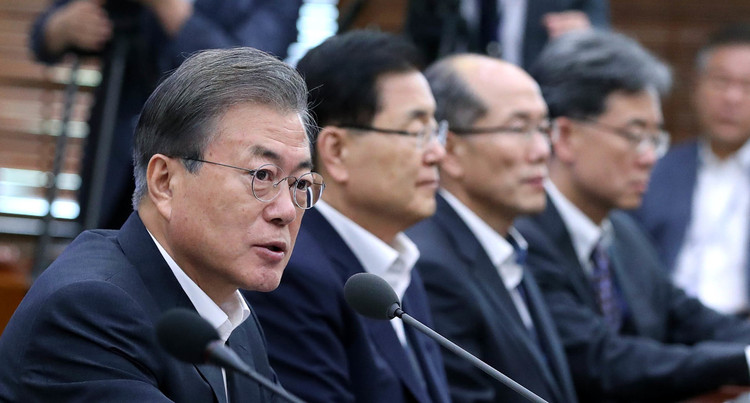Posted on : Jul.9,2019 17:14 KST
Modified on : Jul.9,2019 17:33 KST
 |
|
South Korean President Moon Jae-in presides over a meeting with senior aides and secretaries at the Blue House on July 8. (Blue House photo pool)
|
On July 8, South Korean President Moon Jae-in called on Japan to “withdraw” its economic retaliation measures and enter “good faith discussions,” arguing that a “vicious cycle of action and reaction is certainly not desirable for either of our countries.” Noting that a feedback loop of retaliatory measures between South Korea and Japan could leave both parties facing a difficult situation, he proposed a solution based on sincere dialogue between the two governments. We should not take a light view of the fact that Moon raised the need for bilateral discussions in his first official response to Japan’s retaliatory actions. Tokyo should respond positively to his proposal for good faith discussions, if only to prevent South Korea-Japan relations from becoming damaged even further.
At the moment, dialogue between the South Korean and Japanese governments is basically nonexistent. All we see is a war of nerves, as with Seoul’s refusal of Tokyo’s demand to form an arbitration committee in connection with South Korean Supreme Court rulings awarding compensation for forced labor mobilization. Japan even refused to follow precedent by holding a bilateral summit with South Korea during the G20 Osaka summit late last month. This appears to have been carefully calculated by Prime Minister Shinzo Abe for the sake the economic retaliation measures. We hope Japan does not turn its back on Moon’s call for good faith dialogue, with its proposal that the two governments communicate frankly in order to find a way out of their current frictions. It needs to recognize that if it refuses even that kind of dialogue, it risks allowing the trade conflict between the two sides to escalate beyond the point of no return.
These concerns appear to have been voiced by Moon when he declared that the South Korean government “will have no choice but to take the necessary measures if South Korean companies suffer actual harm” and stressed that he “do[es] not want things to end up that way.” At the same time, we should note that he did not directly target either Abe or the Japanese government for criticism. Noting that the rest of the world is concerned about Japan’s actions, he stressed that Japan “must return to the free trade principles that it has always advocated.” It’s a message that eschewed provocative wording and terminology, and we hope that the Japanese government fully recognizes the commitment in them to opening the door to a diplomatic resolution.
In that sense, it’s very dismaying to hear reports from the Japanese press that Tokyo plans to expand its export controls from semiconductors and display materials to other exports including machine tools and carbon fibers. An increase in the scope of controlled items would require South Korea to take action in response. If it wants to avoid a catastrophe, Japan needs to first stop any moves toward further sanctions and begin an intergovernmental dialogue.
Please direct comments or questions to [english@hani.co.kr]






